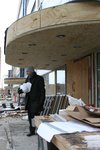


In August of last year, Nick Eyde of the Lansing-based Eyde Co. moved to Toledo to work on the renovation of the 28-floor Owens Corning Fiberglas Tower.
It’s the biggest job of Eyde’s career, but as the COVID-19 pandemic spreads around the world, his thoughts have drifted more toward friends and colleagues in Italy, where he spent several heady years of his life playing professional football.
Eyde, 37, toured the Italian Football League for six years in the 2000s, playing for the Rome Ducks, the Reggio Emilia Hogs and the Bolzano Giants. The biggest moment of his football career was a dramatic win over Bergamo, where the virus hit hardest last month.
Recently, Eyde watched a harrowing video taken inside a Bergamo hospital where doctors made life-and-death decisions and bodies were stacked outside with no place to put them.
“It was a pretty dire situation,” he said. In Bergamo province alone, the virus killed 4,500 people in March.
Eyde is struggling to square the images of empty streets and shuttered restaurants with his memories of bustling northern Italy.
The ingrained gregariousness of Italian culture, and the work ethic prevalent in northern villages and towns, may have contributed to the ferocity of the outbreak.
“It’s a very social culture,” Eyde said. “In other cultures, you might see your grandparents once a week. In Italy, you have much more interactions between generations. They get out to see relatives, extended family, cousins, almost daily, including contact with people who are more vulnerable.”
It didn’t surprise Eyde that in Bergamo, the hardest-hit area, restrictions on mobility and work were met with resistance at first, giving the virus time to get a foothold.
“No matter where I went in Italy, from 6 to 9 p.m., you saw people gathering,” Eyde said. “They were out in the city centers, in pubs and cafes, interacting on a physical level. It’s part of the Italian routine, what keeps them in a happy frame of mind.”
While living and touring in Italy, Eyde relished the urban bustle, good food, wine and fellowship of a culture that is antithetical to social distancing.
“They greet you by kissing you on both cheeks,” he said. “They’ll have long conversations with more depth than just ‘get to the point.’ Maybe that’s part of why Italy was so hard hit. You have a lot of face to face interactions.”
It’s hard for Eyde to imagine Italian sports stadiums sitting empty. He felt the country’s white-hot passion for sports first hand.
By Feb. 23, the virus had gained a foothold in two villages in Bergamo, just two days after a soccer match in nearby Milan drew 45,000 people.
“The big soccer matches, the ones that are really well attended, are in the Milan area,” Eyde said. “They draw the biggest crowds, the are traditionally the better teams. It makes sense that you have a super spreader event feeding into that lively café culture.”
Eyde played in the Bergamo stadium three times. “It was always daunting,” he said. “The games weren’t even close. The second game was 56-0 at halftime.”
The third was a charm, though. Eyde’s happiest Italian memory was Bolzano’s shocking 2006 upset over the Bergamo Lions, a juggernaut of a team that had racked up 73 straight wins and eight championships in a row.
The dramatic climax of the game inspired the closing pages of a John Grisham novel, “Playing for Pizza.”
With 35 seconds left, quarterback Eyde threw an “Ave Maria” pass that gave Bolzano the win, 20 to 14. Grown men cried.
“Nobody expected us to even be in the game, and to win it was surreal,” Eyde said.
Now Eyde is hearing signs of hope from his Italian friends. Thursday morning, he talked with his brother-in-law, who lives in Pescara.
“On the first of May, they’re going to be finally out of official lockdown, free to more around in the parks and so forth,” he said.
The vibrant café and restaurant culture of Italy was a big part of Eyde’s inspiration for pushing the Knapp’s project in downtown Lansing.
However, the vision of Lansing’s streets, crowded with diners and strollers, seems more remote then ever.
Eyde is confident that things will come around.
“Opinions will differ on this, but I don’t know that we’ll see a drastic cultural change,” he said. “We’ll come back to normalcy. People are going to want to go out, go to restaurants and interact with people. This is a serious situation, but we’ve been through some very difficult pandemics in human history.”
The Eyde Company’s spectacular renovation of Toledo’s 400-foot-tall Owens Corning tower, abandoned since 1998 and nearly left to rot, has brought a mid-century Modern landmark back to life. Residents now occupy the top 11 floors, office tenants are in place on three other floors, and about 70,000 square feet of retail space was leased before the current economic freeze.
“We still have floors two through 13 to work on,” Eyde said. “Once we battle with the virus we’ll start thinking about getting back to business.”
Support City Pulse - Donate Today!
Other items that may interest you

Comments
No comments on this item Please log in to comment by clicking here